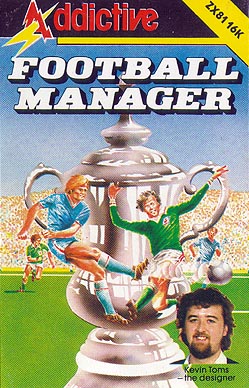Football Manager series (original)
| Football Manager | |
|---|---|
 |
|
| Publisher(s) | Addictive Games |
| Designer(s) | Kevin Toms |
| Platform(s) |
Football Manager: TRS-80, ZX80/ZX81, ZX Spectrum, BBC Micro, Commodore 64, Oric-1/Oric Atmos, Amstrad CPC, Acorn Electron, Dragon 32/64, Commodore VIC-20, Atari 8-bit, Commodore 16/Plus/4, MSX, PC, Atari ST, Amiga Football Manager 2: Commodore 64, ZX Spectrum, Amstrad CPC, Amiga, Atari ST, PC World Cup Edition: Commodore 64, ZX Spectrum, Amstrad CPC, MSX, Amiga, Atari ST, PC Football Manager 3: Commodore 64, ZX Spectrum, Amstrad CPC, PC |
| Release |
Football Manager: 1982 Football Manager 2: 1988 World Cup Edition: 1990 Football Manager 3: 1992 |
| Genre(s) |
Sports game Business simulation |
| Mode(s) | Single player |
Football Manager is a video game series published and developed by Addictive Games, the label set up by the game's creator Kevin Toms. The first game was released in 1982. It was then ported to most home computers during the 1980s and spawned several sequels: Football Manager 2 (1988) and Football Manager World Cup Edition (1990), both designed by Kevin Toms, and finally Football Manager 3 (1992), without Toms' involvement. Football Manager 3 sold poorly, and as a result the series came to an end. The series was claimed to have sold over a million copies by 1992. The game was to start a whole new genre of computer game, the football management simulation.
Toms developed the first game on a Video Genie, a clone of the Tandy TRS-80, and was compatible also with the Dragon 32. This was a text only game. It was converted to the Sinclair ZX80 and ZX81 and Toms created the software label Addictive Games to launch the game in 1982. It was then ported to the ZX Spectrum with added animated graphics showing match highlights.
The game was a huge success and was ported to a wide range of systems between 1984 and 1987. While the Amiga, Amstrad CPC, Atari ST, BBC Micro, Commodore 64 and PC versions, kept or improved all features such as the match highlights graphics, all others (including the Acorn Electron, Atari 8-bit, Commodore Plus/4 and MSX) were, like the original, text only.
...
Wikipedia
